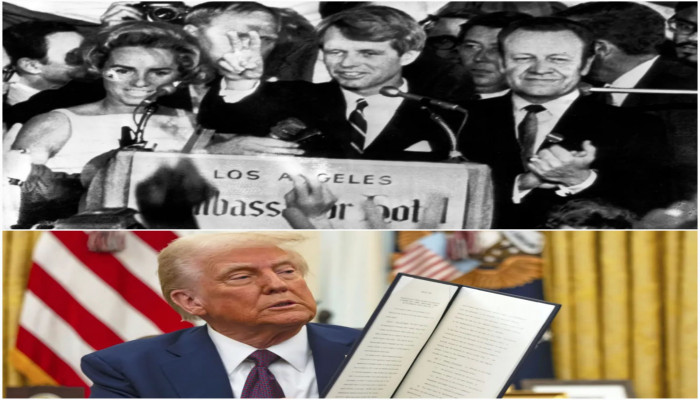10,000 pages of Robert F. Kennedy assassination declassified and released publicly
- In Reports
- 02:31 PM, Apr 19, 2025
- Myind Staff
Around 10,000 pages of documents related to the 1968 assassination of Senator Robert F. Kennedy were made public on Friday. Among them were handwritten notes from the shooter, who wrote that Kennedy "must be disposed of" and admitted to being fixated on killing him. Some documents had already been available to the public, but many had not been digitised and remained in government storage for decades. Their release is part of an effort to make historical investigation records more accessible, following an order from former President Donald Trump.
Kennedy was shot and killed on June 5, 1968, at the Ambassador Hotel in Los Angeles, shortly after delivering a victory speech for winning California's presidential primary. His killer, Sirhan Sirhan, was found guilty of first-degree murder and is currently serving a life sentence. The newly released records include photos of Sirhan’s handwritten notes.
The message on the outside of an empty envelope read, "RFK must be disposed of like his brother was," referencing the 1963 assassination of Kennedy's older brother, President John F. Kennedy. The return address listed was that of the district director of the Internal Revenue Service in Los Angeles.
The National Archives and Records Administration has uploaded 229 files to its public website. This release follows the disclosure of unredacted documents last month related to President Kennedy’s assassination. While those earlier files offered more insight into U.S. covert operations during the Cold War, they didn’t support long-standing conspiracy theories about JFK’s death. Health and Human Services Secretary Robert F. Kennedy Jr., son of Robert Kennedy, praised the move.
A statement released by the health secretary read, "Lifting the veil on the RFK papers is a necessary step toward restoring trust in American government ".
The documents related to Robert Kennedy’s assassination include interviews with people who knew Sirhan from different parts of his life, such as classmates, neighbours, and coworkers. Some described him as “a friendly, kind and generous person.” In contrast, others saw him as a serious and “impressionable” young man with strong political views and a brief interest in mysticism. One file mentions that Sirhan told his garbage collector he intended to kill Kennedy shortly after Martin Luther King Jr. was assassinated on April 4, 1968. The sanitation worker, a Black man, had told Sirhan he supported Kennedy because he believed Kennedy would help Black Americans.
“Well, I don't agree. I am planning on shooting the son of a bitch,” Sirhan allegedly said, according to the man’s account to investigators.
Larry Sabato, who heads the University of Virginia Centre for Politics and wrote The Kennedy Half-Century, said that conspiracy theories have long surrounded Robert Kennedy’s assassination. He expects the release of documents on Friday to be similar to how the JFK files were made public earlier this year. He emphasised that the review should be done with care and not rushed, "just in case there is a hint in there or there is an anecdote" that might help reveal more about what happened. "I hope there's more information," Sabato stated. "I'm doubtful that there is, just as I said when the JFK documents were released."
Some parts of the documents posted online on Friday were still redacted, including names and birth dates. Just last month, the Trump administration faced backlash for releasing documents related to President John F. Kennedy's assassination that included unredacted personal details, such as Social Security numbers. Trump, a Republican, has supported making records about major assassinations and investigations public in the name of transparency. At the same time, he has long expressed distrust toward the country’s intelligence agencies. By releasing previously hidden files, his administration has allowed the public to examine the actions and findings of agencies like the CIA and FBI more closely.
In January, Trump signed an executive order calling for the release of documents related to the assassinations of Robert F. Kennedy and Martin Luther King Jr., who were both killed just weeks apart. Lawyers representing Kennedy’s assassin have argued for years that he is no longer a threat and should be released. In 2021, a parole board agreed. However, California Governor Gavin Newsom overturned that decision in 2022, keeping him in prison. Then, in 2023, another parole panel denied his release again, saying he still hasn’t fully understood what led him to carry out the shooting.
Kennedy is still admired by many liberals, who view him as a strong advocate for human rights and deeply committed to tackling poverty and racial and economic inequality. They often see his assassination as one of the final blows in a series of national tragedies that pushed the U.S. toward a more conservative and troubled political direction.
During his life, Kennedy was not without controversy. Some critics argued that he was slow to oppose the Vietnam War. He entered the 1968 presidential race after President Johnson's vulnerability became clear following the New Hampshire primary. Appointed U.S. attorney general by his older brother, JFK, Kennedy served as a trusted advisor until the president was assassinated in Dallas. In 1964, he was elected as a U.S. Senator from New York and came to be viewed as the leading figure to carry on the Kennedy family’s political legacy.







Comments